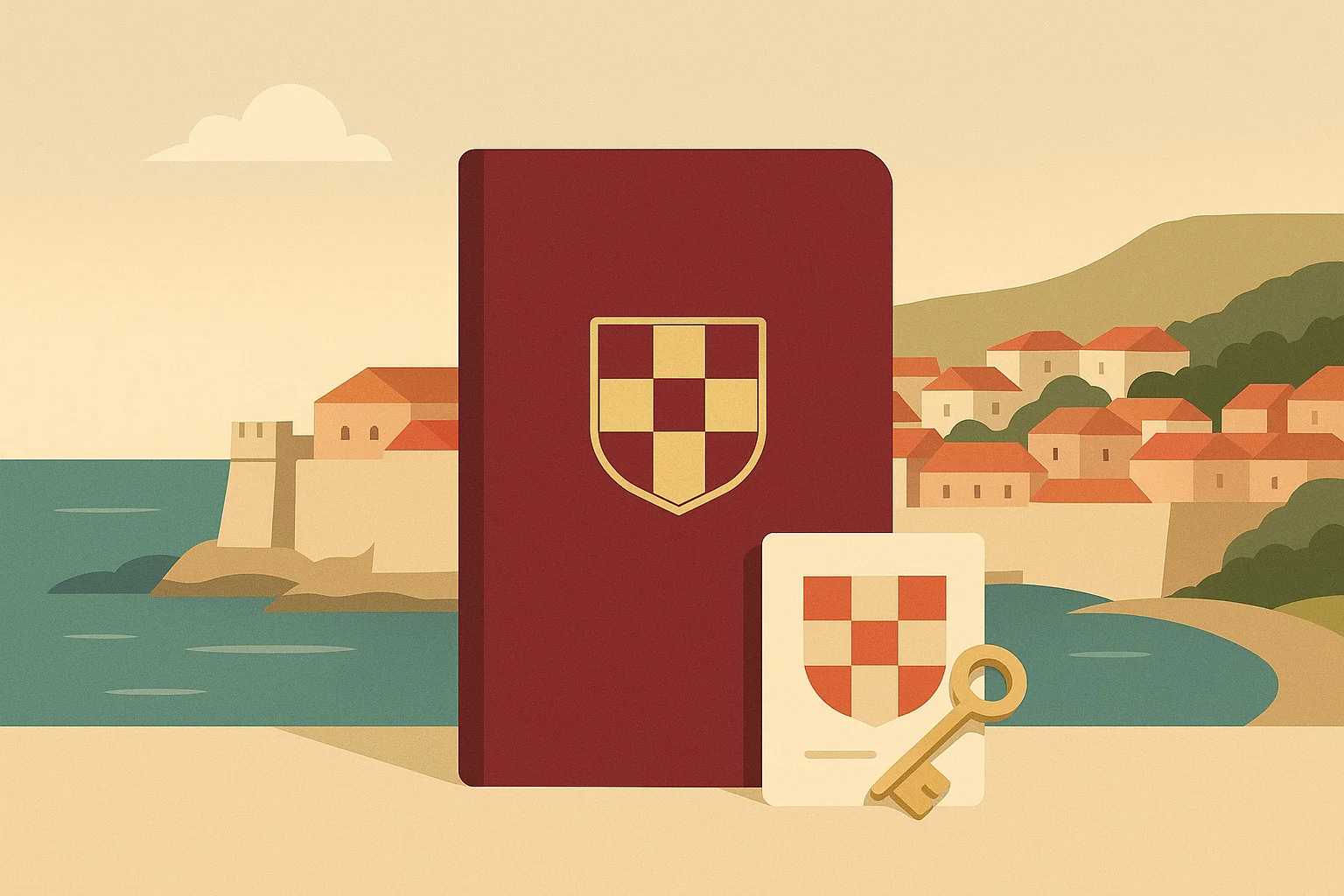How to Get Croatian Citizenship (2025): Routes, Requirements & Timeline
120
9/24/2025

How to Get Croatian Citizenship (2025): Routes, Requirements & Timeline
Croatian citizenship provides EU freedom of movement, Schengen residence rights, and access to one of Europe’s fastest-growing Adriatic economies. In 2025, there are several recognized routes to citizenship: naturalization (after long-term residence), descent (heritage), marriage to a Croatian national, and special interest cases. This guide explains each path, the documents, requirements, and timelines.
Overview (one table)
| Route | Requirements | Timeline |
|---|---|---|
| Naturalization | 8 years of residence (including 3 years permanent stay), language & integration | ~8–10 years total |
| Descent | Proof of Croatian origin (parent, grandparent); documents legalized | ~12–18 months |
| Marriage | 3 years of marriage + 3 years residence in Croatia | ~3–5 years |
| Special interest | Exceptional contribution to Croatia (cultural, economic, scientific) | Varies; discretionary |
Naturalization (residence-based route)
For most foreigners, the standard route is naturalization. You must live in Croatia for at least 8 years continuously, including at least 3 years with permanent residence. Applicants must demonstrate knowledge of Croatian language, Latin script, culture, and legal system. Integration is measured through interviews, certificates, and proof of community life.
Citizenship by descent
If you have a Croatian parent, grandparent, or in some cases further ancestry, you may claim citizenship by descent. Key requirements include legalized birth certificates, marriage records, and proof of continuous Croatian nationality in your lineage. This route does not require residence in Croatia but involves document-heavy verification.
Citizenship by marriage
Foreign spouses of Croatian citizens can apply for citizenship after 3 years of marriage and 3 years residence in Croatia. Proof of genuine family life, joint accommodation, and integration are crucial. Authorities conduct interviews and sometimes home visits to confirm legitimacy.
Special interest citizenship
Croatia occasionally grants citizenship to individuals of strategic interest — prominent scientists, athletes, investors, or cultural contributors. This is discretionary and rare, requiring ministerial recommendation and government approval.
Documents checklist (2025)
- Valid passport
- Birth certificate, legalized and translated
- Marriage certificate (if applying by marriage)
- Proof of residence history in Croatia
- Permanent residence card (for naturalization)
- Police clearance certificates from all countries of residence
- Proof of language knowledge and integration (exam certificates or interview)
- Proof of financial self-sufficiency (employment, assets, or business records)
Costs and fees
- Application fee: €200–300 depending on route
- Translations & legalization: €500–1,500 depending on volume of foreign documents
- Language exam (if required): €100–200
- Legal support: optional but common, €1,000–3,000+
Integration requirements
Integration plays a key role in naturalization. Applicants should demonstrate:
- Ability to speak and understand Croatian
- Knowledge of Croatian culture, history, and legal system
- Community participation (schooling of children, local associations, etc.)
Timeline summary
- Naturalization: 8 years residence, ~1–2 years processing
- Descent: ~12–18 months
- Marriage: 3+ years residence and marriage, ~12–24 months processing
- Special interest: variable, case-by-case
Common mistakes
- Submitting incomplete ancestry documents for descent claims
- Assuming marriage automatically guarantees citizenship
- Not maintaining continuous residence for naturalization
- Ignoring integration requirements (language test, culture)
FAQ
Can I hold dual citizenship with Croatia?
Yes, Croatia allows dual citizenship in most cases, especially for descent-based applicants.
Is buying property enough for citizenship?
No. Property may support residence but does not lead directly to citizenship.
How long must I live in Croatia for naturalization?
At least 8 years, including 3 years with permanent residence.
Do children automatically become citizens?
Yes, if born to at least one Croatian citizen parent. Otherwise, they may be included in parental applications.
Expert opinion
“Croatia offers flexible descent-based citizenship but remains strict with residence-based naturalization. The strongest applications align long-term residence with language and cultural integration.” — VelesClub Int. legal team
Next steps
Interested in Croatian citizenship? Explore our guides and check the Residency & Citizenship hub for structured insights on eligibility and applications.
Are there any questions or do you need advice?
Leave a request
Our expert will contact you to discuss tasks, choose solutions and be in touch at each stage of the transaction.
